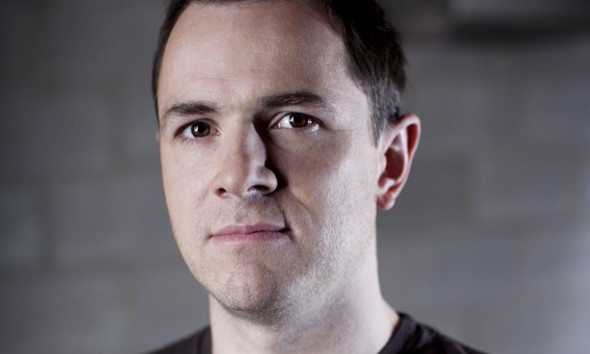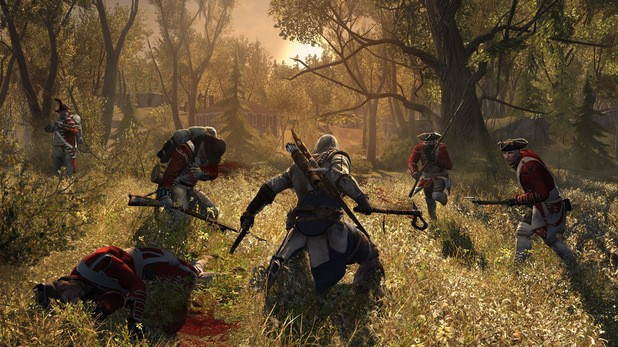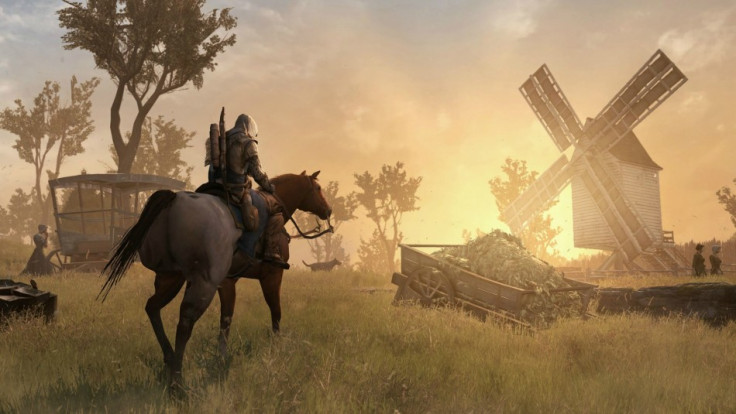Alex Hutchinson Interview - Creative Director of Assassin's Creed 3
On the American Revolution and creating an epic
To coincide with our extensive review of Assassin's Creed III, we chatted with creative director Alex Hutchinson about the game's three-year development process

IBTimes UK: What are you ambitions with Assassin's Creed III?
Alex Hutchinson: There are a lot of answers to that. On one level we're trying to progress the franchise. I think we're trying to make a standalone game, too. We want to make a truly landmark videogame that people will talk about in years to come. If we're going to spend three years of our lives on this, then we want to make something that's important and special.
So, we decided to take some big risks. We wanted a minority as a lead character, a setting that people didn't expect; we wanted new gameplay like naval battles or tree-running that people had never seen before; and we wanted to wrap that up, polish it and truly create an epic.
For me, I wanted to bring back the sense of wonder that I used to have as a player. There's so much communication these days and information is so easy to find, so everyone is always bored of your game even before release. We wanted to keep a few things secret.
IBT: So how does Connor being a minority feed into his story?
AH: We decided early on that his story could not be about being a Native American. It can't be the only focus of his story, because then we'd be pandering. So, the idea is that his background informs his character and how he behaves and what he cares about, but that his story still needs to be our big, epic story of how this guy becomes involved in the American Revolution.
One of the beauties of Assassin's Creed is that we can tell a story across decades, so we tried very hard to have a very different character at the end of the game compared to the beginning.
IBT: So does Connor have, like Ezio, a character arc?
AH: Yes, but I think it takes place inside just Assassin's Creed III.

IBT: What was it about Revolutionary America that you found interesting, or complementary to Assassin's Creed?
AH: We like the idea that the discussion of the period involved power and freedom, control and slavery and all these things that reflect the big argument between the Templars and the Assassins.
We also liked the idea of how much nature there was, and how young the cities were; we liked the idea, perversely, that although a lot of games are set in America, not many are set in eighteenth century America.
And we liked the idea that people would immediately respond that this is impossible, and that we couldn't possibly set a game here because that means we're doing something fresh.
IBT: That must have taken a great deal of research
AH: Yeah, you don't ever stop researching, really. So it was a case of finding every map that we could, because we built Boston and New York at 1:3 scale based on those maps. We looked at what kinds of trees were growing, what animals were native; what kind of dress people wore.
And we built huge charts of historical characters so we could follow who was alive, what parts of America they were in. Because we don't want to change history we needed to make sure that everyone was in where we wanted them to be.
So, for example, we had the idea early on that Benjamin Franklin would be a very central character, but he was in France for most of the American Revolution, so he was never going to work as a major character.
As well as being accurate, we're also trying to find those key fantasies that exist in history, the things that make people think it was a cool time and place. We do as much as we humanly can to keep things accurate, but then we try to pump it up a little.

IBT: Playing the game, the environments feel much more rural and developing than say Florence or Acre from previous Assassin's Creeds.
AH: Tonally, it's very different. In terms of physical scale, Assassin's Creed III is much bigger than previous games, especially once you get to the Frontier, which is about twice the size of Brotherhood's Rome. We realised that the beautiful vistas in this game would come more from nature than cities.
IBT: So there's more time spent outside of cities than in previous games?
AH: Oh for sure, and if you think that all the big battles and events often happened between cities in the American Revolution, then we needed to get out of town; I'd say about 30 percent of the main story takes place on the Frontier.
IBT: In terms of those battles, what was your stance on the American Revolution? Which side does Connor fall on?
AH: Connor isn't on anybody's side, he's always been part of the Assassins. And you'll find that Assassins and Templars are on both sides of the conflict. Connor is not a patriot or a loyalist.
IBT: The game seems a lot grimmer and more melancholic compared to previous Creeds.
AH: I think that's very true. It is a darker story; one of our key words early on was earnest, which I know is a word you should never use because it sounds so lame, but we're going to be earnest about the period and telling a story.
One thing that we haven't talked about before is that videogames are a challenge, but a challenge that you have to be able to win. So, if there is no fear of losing then there is no emotion. And that's compounded in Assassin's Creed because you're reliving history, so not only are you going to win, you know when you start who wins and how they win.
It's hard to get people to care these events when you know what happens. Obviously there's the fictional stuff that we can play with; we have this minority lead character who in his period is trying to make things right, but we know, seeing him today, where that ends up.
And that gives you a new emotion to play with, this idea that you as a player are fighting something you cannot possibly change.
So, we tried to get that feeling into the game wherever possible. I really hope we get it right because, it's IN videogames, it's a very true feeling. And if you get it right then people will find it; I think the genius of BioShock, the whole do what you told feeling, is a great idea and it's brilliantly executed, but it's essentially a twist. And like any twist, it's a one-use, so, whoever gets this feeling like what we're hoping for gets to own it, and keep it.
IBT: Of course, this is also a period where there are issues like slavery. How does the game respond to that?
AH: Often when people play a game or watch a movie about the past they want the past to be better than it was. They want people to have a realisation 400 years before it happened, about women's rights or something and, objectively, it didn't happen.
So we looked at the period and there just wasn't the discussion about slavery. Of course, if we were doing the Civil War, it would be key to the story. But in this period, it wasn't an active topic - we didn't want to start a conversation that we couldn't finish.

IBT: And what are you most personally proud of?
AH: Personally, I'm just so proud of the breadth and scope of what we've achieved in Assassin's Creed III, and the fact that there are secrets and things still in the game that PR and marketing hasn't managed to spoil. The fact you can put the disc in the tray and there will still be surprises in there is what I miss - that sense of wonder.
When I was a kid and could only buy two games a year, I remember driving back home with my mum and looking at the manual and the box and imagining what surprises there would be in the game. There's a joy in that, that I think we've lost with saturation exposure, so, the goal was to get a little bit of that back.
And based on the number of kids yelling at me on Facebook about videos they've seen on YouTube, I think we've gotten close to that.
IBT: Are there plans for a further game?
AH: There is no chance of us not making more Assassin's Creed games. We can end parts of things without ending all of it; you need endings, to give satisfaction and payoff, but that doesn't mean you can't embed them with new beginnings.
IBT: And which period would you see the game heading to next?
AH: I think our goal would be to do surveys, and to whichever place everybody said "absolutely not there", that's where we would go.
© Copyright IBTimes 2025. All rights reserved.





















